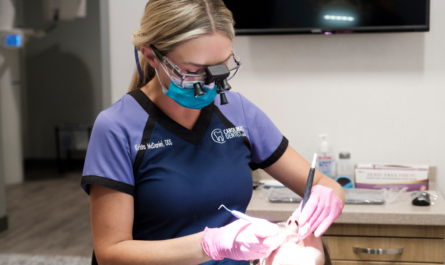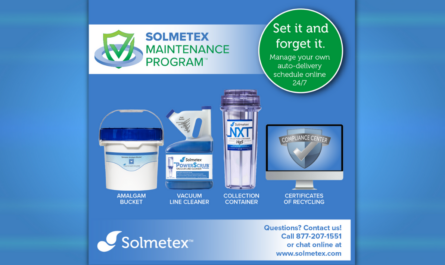By Rhonda Mullins
Hiring top line team members results in bottom line success because motivated and dedicated team members not only share the practice vision, culture, and mission, they feel invested in the practice. When employees feel mentally and physically invested in the company their loyalty, performance and production increases. Highly skilled, motivated, and self-directed staff and team members are crucial to the growth of dental practices today. This article enumerates the many benefits to hiring ideal employees, discusses the importance of the work environment and the employer/employee relationship in attracting and retaining top line team members, and highlights the ways a superior staff working to incorporate care-driven® dentistry, the 4 Capital Quadrants, and the C4 YOURSELF® concept translates into higher case acceptance, enhanced patient satisfaction, and increased
patient referrals.
Objectives
Upon completion of this article, readers will able to:
- List steps to attract and hire top-line employees.
- Describe specific methods for keeping employees motivated.
- Discuss how the relationship between employee and employer affects the success of a practice.
- Explain why hiring dedicated employees results in practice success.
Introduction
Managing a business presents many challenges particularly for dentists whose primary interest is not to manage, but to provide first-class dentistry. Assembling a “top line” team is foremost among them. When you hire, encourage, and galvanize highly skilled, motivated, and self-directed team members, they embrace and share the vision and mission of the practice which ultimately leads to bottom line success. Well-defined roles and responsibilities allow employees to concentrate their energies and incorporate the 4-C concept – Credibility, Communication, Competence, and Care into their daily routines. As a result they are able to relate to and understand patient needs and desires, and translate those into experiences that lead to an increase in case acceptance, referrals, and overall better treatments.
The most valuable asset of any business is relational capital.1 The relationships between employer and employees, and the dental team and patients, are key to the sustainability and growth of the practice. Staff, dental assistants, and hygienists are especially vital to the dental practice because of the nature of dentistry. Patients have more contact with dental staff than the dentist. Their first impression of the practice is gleaned from the front desk staff either in person or by phone, and we are all familiar with the saying “first impressions are lasting impressions.” Next, they visit the hygienist, at least twice a year, and if they manage their own oral health successfully, will rarely see the dentist. Therefore, attracting, hiring, and retaining top-line team members is an investment in the success and future of your dental practice.
Attracting Top Line Team Members
Today’s professionals are looking for the total package: job security, an attractive financial package, benefits, a challenging work environment, professional fulfillment, opportunities for growth, flexibility, empowerment, recognition, and rewards.
Flexibility – today’s employees seek balance. It is important to their quality of life. A flexible schedule provides the freedom to meet family responsibilities and obligations, spend time with family and friends, and to pursue personal growth.
Room to lead and grow – micro-managing your employees sends the wrong message. They are high functioning, intelligent adults and wish to be treated as such. Show confidence by allowing them the freedom and space for problem solving, decision making, and to apply their own unique strategies to handle situations and reach professional goals. Also, provide opportunities for growth and leadership positions.
Energize them with your vision – speaking confidently and with emotion regarding your goals and vision for your practice, and their potential role and contribution to the future of the practice, will inspire them to share that vision and apply their knowledge and skills toward reaching your goals.
Financial package – although research indicates that money alone does not attract and retain employees, it can speak volumes. Underpaid is undervalued, but a generous salary shows the employee that their knowledge, skills, and experience are a valued contribution to the practice or company. Benefits, bonuses, and paid vacations also attract employees.
Environment – environment is a huge selling point for employees. Much of their day is spent at work and an oppressive atmosphere does not create job satisfaction or attract patients. Employees, just as patients, prefer a warm and friendly atmosphere rather than a sterile, indifferent environment.
Hiring and Retaining the Ideal Employee
Although an important investment of resources, interviewing and hiring the “right” employee can be time consuming
and imbued with miscues. Cognizance of your practice culture is crucial to minimizing such mishaps. Defining your approach in the three keys areas of your practice will help you identify what qualities are desirable in a new hire. Listing the managerial characteristics of your practice, the clinical, and the cultural characteristics will help focus your efforts. For instance, at what pace does activity in each area proceed (is it laid-back, rapid, intense), what conduct and demeanor is expected of employees in respective areas (should they be open and friendly, or serious and at attention), is a certain volume maintained – are boisterous personalities welcome, or is a quiet, reserved personality a better fit? Once you are aware of your workplace culture you can focus on the personalities, strengths, and talents of perspective hires that align with your practice atmosphere, vision, and mission. Hiring employees who share your vision and work ethic reduces potential future conflicts and turnover.
Turnover can be costly in any business but in dental practices losing an employee – particularly a hygienist – can mean losing patients loyal to that employee, making it even more damaging. So, once you attract the best employees how do you retain them? According to research the number one reason employees leave their positions is their supervisor. Therefore, being an effective leader is crucial. The interpersonal dynamics between the dental team and their dentist is key to employee retention.
Incorporating the C4 Yourself Leadership and Management practices will help make you an effective and successful leader.
(C1) Credibility – employee surveys indicate that credibility and employer honesty are the two most important aspects regarding their relationship with their supervisor.2 According to employees it is important that leaders can be believed, trusted, respected, are credible, and lead with integrity.
(C2) Communication – communication is of the utmost importance considering 70-90% of a supervisor’s day involves communication.3 Effective leadership is highly dependent upon an open, honest, clear, style of communication as well as responsiveness to employee needs and concerns.
(C3) Competence – employers who display knowledge and expertise in their field gain the respect of employees. Competence is attained via training and education. Stay abreast of new developments, procedures, materials, and technology in your field and continue to incorporate them into your practice. Employees will take pride in providing state-of-the-art services, and these positive feelings will be noticeable in the way they speak, act, perform their duties, and most importantly, the way they treat patients.
(C4) Care – research shows that not only is job satisfaction higher when employees feel their employers care about them, but their work quality and productivity increases.4 Provide recognition and appreciation for employee contributions, achievements, growth, commitment and dedication. Not only are employee efforts analogous to their feelings of being valued4 but studies show that appreciated employees display a higher level of commitment and loyalty resulting in increased job satisfaction, decreased absences, and higher retention rates.
There are numerous ways to show employee appreciation, and the easiest and least expensive is praise. You can praise them privately, or publicly during a company meeting or in a company newsletter. You can also reward them with something more tangible such as tickets to the theater, a sporting event, a visit to the spa, or a day off with pay.
The 4 Capital Quadrants
The popularly held belief that the right amount of money will keep any employee happy is a misnomer. The importance of salary should not be understated, but there is more to job satisfaction than money. As a business person and employer it is wise to be familiar with the relevance of the 4 Capital Quadrants: Relational, Reputational, Educational, and Financial Capital. The C4 Yourself Leadership and Management practices mesh effortlessly with the 4 Capital Quandrants. Relational Capital refers to how you interact with, relate to, and treat your fellow workers and patients. Caring and respect are key. While salary and benefits are still important, employees want to feel valued and know that their contributions are appreciated. Research indicates that respect, appreciation, and a sense of purpose are rated higher among employees than salaries or other tangible benefits.
Positive employer/employee relations directly affect Reputational Capital which in turn influence profit. One of the three most acknowledge forms of leadership (the other two being Laissez-fair and Autocratic) Democratic leadership has been proven the most successful. Democratic leadership relies on employee input and allows each employee the space to be themselves while contributing their skills and talents to the company. A democratic employer respects and values employees, and appreciates their individualism and creative ideas. In the dental practice this takes the form of team collaboration when decisions and/or changes need to be made. Everyone is welcomed and encouraged to contribute their ideas and feelings, resulting in a deeper commitment to the practice. While willing to provide guidance when needed, democratic employers encourage their employees to solve problems and make decisions on their own when required. In an effort to fulfill the need for self-actualization, together employer and employee establish professional goals for the growth and development of the employee within the practice or company. Democratic leadership tends to be one of the most effective styles of leadership because it establishes a positive, caring environment in which employees feel valued and as a result motivated to provide their ultimate performance. A dominant aspect of the Democratic Leadership style is how the employer conducts themselves. Rather than blame or punish when a conflict, mistake, or misunderstanding presents itself, the employer considers their employee’s feelings and shows compassion and understanding utilizing the situation as a learning experience that everyone can benefit from. Primarily, the leader conducts themselves with honesty, integrity, and empathy earning the admiration and respect of employees.
It has been proven that ineffective leadership affects staff morale, patient satisfaction and, ultimately, practice success. A Harvard research study based on neurological and psychology determinants has proven that a leader’s attitude, actions, and mood can make or break a business because employees are so tuned into their employers that their actions and reactions permeate every aspect of the organization, especially employee attitudes and performance.
The study demonstrated how the presence of another person can change our physiology, including cardiovascular functions, sleep rhythms, and attitude, i.e., a calm presence can reduce blood pressure, and the release of harmful fatty acids. Therefore, it is important to strive to be a positive and calming force within your practice or organization and to maintain positive relationships with employees.
Educational Capital is the investment made in your and your team’s knowledge and professional growth. A leader who invests time and finances in the increased knowledge of their profession not only gains the respect of employees, but also patients. Equally, leaders who invest in the continued education of their employees benefit from their advanced knowledge and skills, and from their increase in job satisfaction, loyalty, and long-lasting commitment. With every CE course that a dentist or team member takes, every degree held by each employee increases the value of their contributions and increases the value of your practice.
Reputational Capital is highly regarded. More often than not, when asked “How did you hear about us?” the answer is by word of mouth, from a relative or a friend. There are many facets involved in building a good reputation for your dental practice including quality, efficiency, dependability, commitment, relational capital, and atmosphere. A good reputation attracts patients, increasing opportunities for profit, but it also attracts employees. Practices that provide a friendly, family atmosphere while offering efficient and quality treatments gain a good reputation and consequently are inundated not only with new patients, but with applications for employment.
Financial Capital is defined as the money, goods, or services used to generate income, your practice space, instruments, staff, team, yourself and the technology all fall within the definition of Financial Capital.
The congruency of C4 Yourself Leadership and the 4 Capital Quadrants becomes apparent when you realize that the four C’s in C4 Yourself Leadership and Management Principals fall within Relational Capital and build Reputational Captial; C3 and C4 fall within Educational Capital; and Relational, Reputational, and Educational Capital are all sources of Financial Capital creating a metric for successful leadership and management. However, to maintain a successful practice it is imperative to go one step further by incorporating Care-Driven® dentistry into the equation.
Care-Driven® Dentistry
Care-Driven® dentistry benefits everyone involved. Since it is based on cultivating trusting, respectful, caring, long-term relationships with patients it too relies on the four C’s defined in the C4 Yourself Leadership practices. The same values important to employees in their relationship with their employer are equally important to patients in their relationship with the dentist, staff, and team. Studies show that unsatisfactory relationships between the patient and dentist are the major reason patients change dental practice providers. Strong patient/dentist relationships are cultivated using the four C’s: Credibility, Communication, Competence, and Care.
Conclusion
All people appreciate and prefer being treated with kindness, caring, and respect, and all people want their practitioners to be trustworthy and competent. These values keep patients returning, and it increases employee retention. Human relations are meaningful to all involved and a sense of purpose is especially meaningful to employees. Serving a purpose leads to job satisfaction resulting in job retention. In the end, all three systems contain interrelated parts contributing to the successful performance of the practice and benefitting the dentist, dental practice, employees, staff, and patients.
Rhonda Mullins is a dental practice development strategist who combines business savvy, clinical aptitude, and transitional analysis to inspire successful changes for her clients. An L.D. Pankey Institute and Dawson Academy trained dental laboratory owner/technician, Ms. Mullins launched her consulting company in 1993 and today is an accomplished lecturer, educator, and consultant and has authored numerous articles in dental publications about achieving optimum results through practice transformations and incorporating Care-Driven® dentistry. For more information Ms. Mullins can be reached at: [email protected] or [email protected]





